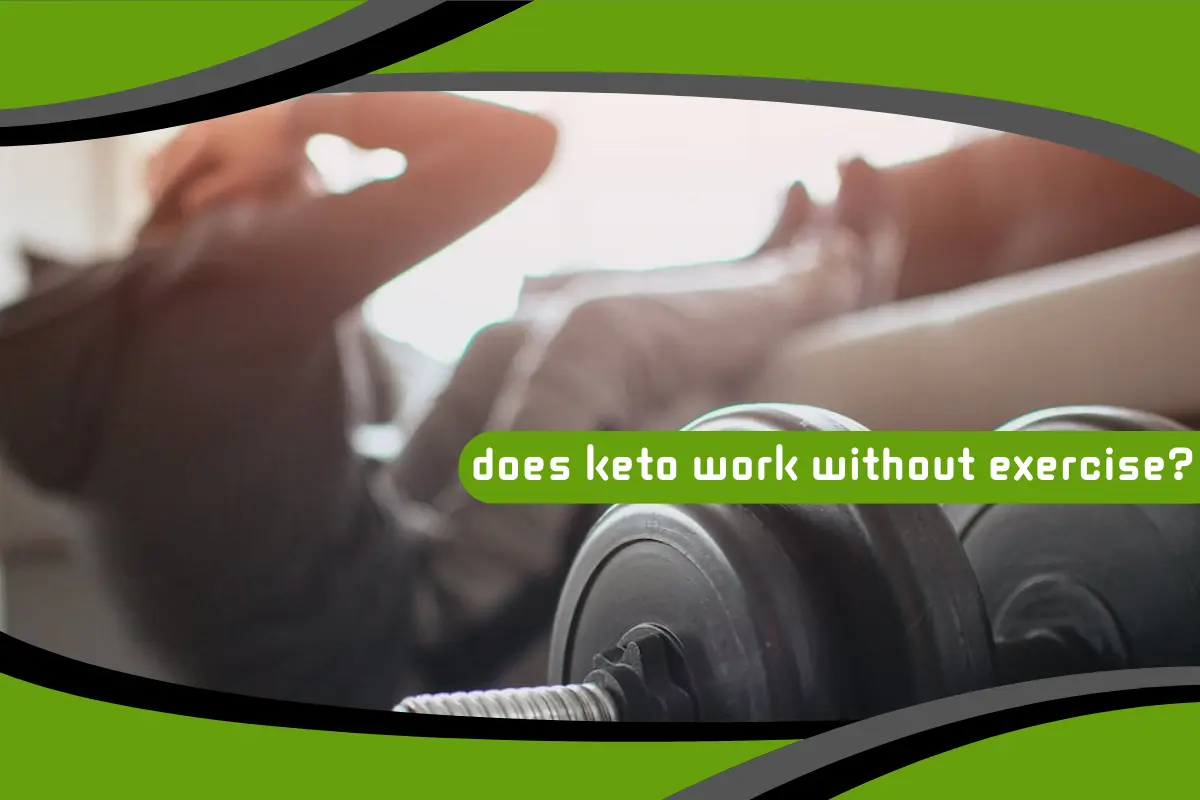The ketogenic diet, widely known as the “keto” diet, has gained tremendous popularity over the past decade for its promise of rapid weight loss and improved metabolic health. But one of the most common questions people ask is whether the keto diet can deliver its benefits without exercise. For many individuals with physical limitations, busy schedules, or simply a dislike for the gym, this is a key concern. To answer this, we need to dive deep into the science of ketosis, fat loss, metabolic changes, and how they interact with physical activity—or the lack thereof.

Understanding the Basics of the Keto Diet
The ketogenic diet is a high-fat, moderate-protein, and very low-carbohydrate dietary approach designed to shift the body into a state called ketosis. In this state, the body begins to rely on fat rather than carbohydrates as its primary source of fuel. This metabolic adaptation can promote fat burning and weight loss, but the diet must be followed precisely to maintain ketosis and reap its full benefits.
How Ketosis Works in the Body
When carbohydrate intake drops significantly, insulin levels decrease, and the liver begins converting fats into ketones. These ketones then become the body’s main energy source. Even without exercise, this shift forces the body to burn stored fat, potentially leading to weight loss. The metabolic state of ketosis mimics the effects of fasting, but without requiring total food deprivation.
Weight Loss on Keto Without Exercise
Yes, weight loss is possible on keto without exercising. Since the diet induces a calorie deficit by reducing hunger and shifting metabolism, many people lose fat without stepping foot in a gym. The absence of carbohydrates lowers insulin levels, making it easier for the body to release stored fat for energy. However, this process may be slower and less efficient than if paired with physical activity.
Watch also: How Much Weight Can You Really Lose on the Keto Diet? Expert Guide to Weekly and Monthly Results
Muscle Preservation in a Sedentary Keto Lifestyle
One concern about avoiding exercise while on keto is muscle loss. Without resistance training or regular physical activity, the body may not have enough stimulus to preserve lean muscle mass. Although keto provides moderate protein to help protect muscle, exercise remains crucial for maintaining strength and body composition. Still, if your goal is primarily fat loss, muscle loss may be minimal with proper protein intake.
The Role of Caloric Deficit Without Workouts
Keto naturally reduces appetite, often leading to an unintentional calorie deficit. Even without physical activity, this caloric shortfall can drive weight loss. However, without exercise, you may need to be more mindful of portion sizes and macronutrient balance to ensure the calorie deficit is consistent and sustainable over time.
Metabolic Adaptation Without Physical Activity
Over time, the body adapts to calorie restriction and weight loss by reducing metabolic rate. This adaptive thermogenesis can slow progress. Regular exercise can help prevent this slowdown by boosting metabolism. Without it, those on keto might experience a plateau sooner. Strategic refeeding or diet breaks may help combat this effect in sedentary individuals.
Appetite Suppression on Keto
One of the lesser-known benefits of keto is appetite suppression. Ketones influence hunger-regulating hormones like ghrelin and leptin, often reducing cravings. This makes it easier for sedentary individuals to stick to the diet. Without hunger pangs or blood sugar crashes, managing calorie intake becomes more effortless—even in the absence of workouts.
Insulin Sensitivity Without Exercise
Exercise improves insulin sensitivity, a key factor in weight regulation and metabolic health. However, keto itself enhances insulin sensitivity by lowering carbohydrate intake. While this improvement is typically greater when combined with exercise, keto alone can still produce significant metabolic changes, especially in those with insulin resistance or prediabetes.
Fat Adaptation Versus Fitness
Fat adaptation occurs when your body becomes more efficient at burning fat for fuel. This can happen on keto even without exercise, but it may take longer. Active individuals tend to adapt faster due to higher energy demands and more frequent fat utilization. Without exercise, patience and consistency with the diet are crucial to achieving full fat adaptation.
Energy Levels Without Exercise
Some people worry they’ll feel sluggish on keto without the stimulating effects of exercise. However, many report improved mental clarity and stable energy once fully fat-adapted. The key is staying consistent through the initial adaptation phase, which can take several weeks. Without carb crashes, energy levels often become more predictable and stable, even for sedentary individuals.
Keto and Body Composition Without Workouts
Without exercise, weight loss on keto typically results in both fat and some lean mass reduction. This can impact overall body composition and aesthetics. Resistance training, even minimal, helps preserve lean mass. However, careful attention to protein intake and nutrient timing can also support muscle maintenance in non-active individuals.
Importance of Protein Intake on Keto Without Exercise
Protein plays a vital role in preserving lean muscle during weight loss. On a sedentary keto regimen, it’s crucial not to under-consume protein. Aim for moderate, consistent protein intake distributed across meals. This helps prevent muscle catabolism and supports overall metabolic health, even without the added stimulus of physical activity.
Watch also: How to Transition Off the Keto Diet Without Gaining Weight: A Step-by-Step Carb Reintroduction Guide
Keto and Hormonal Health Without Exercise
Keto can positively influence hormone levels related to hunger, fat storage, and insulin response. However, exercise adds an additional hormonal boost, particularly to growth hormone and testosterone. While hormonal balance can improve on keto alone, the combination with movement tends to be more synergistic. Still, improvements can be seen in sedentary individuals, especially those coming from poor dietary habits.
The Impact of Sleep and Stress
When not exercising, other lifestyle factors become even more important. Poor sleep and chronic stress can hinder weight loss, even on keto. Elevated cortisol from stress can promote fat storage, especially around the midsection. Prioritizing restful sleep and stress-reducing activities like meditation or walks can help optimize results.
Water Weight Loss Versus True Fat Loss
Initially, keto causes rapid water loss as glycogen stores are depleted. This can give the illusion of quick fat loss. Without exercise, distinguishing between water weight and true fat reduction is vital. Continued fat loss depends on sustained ketosis and a calorie deficit, which can occur without physical activity but requires dietary diligence.
Digestive Health on a Sedentary Keto Diet
Lack of movement can slow digestion, sometimes leading to constipation on keto, especially due to reduced fiber intake. Including non-starchy vegetables, staying hydrated, and considering magnesium or digestive enzymes can help. A sedentary lifestyle makes dietary fiber and hydration all the more critical to maintaining gut health.
Mental Benefits of Keto Without Physical Activity
Keto is often praised for its cognitive benefits, including enhanced focus and mood stability. These benefits can still occur without exercise due to the brain’s efficient use of ketones for energy. People report fewer mood swings, better concentration, and reduced anxiety—all of which can be especially helpful for those unable or unwilling to engage in physical activity.
Managing Plateaus Without Exercise
Weight loss plateaus can happen with any diet. Without exercise to boost metabolic output, adjustments may need to be made through diet alone. Intermittent fasting, calorie cycling, or adjusting fat-to-protein ratios can help overcome stalls. Tracking food intake becomes more important when movement isn’t part of your daily routine.
Long-Term Sustainability of Keto Without Workouts
Sustaining keto without exercise requires discipline and strategic planning. Social eating, boredom, and limited food choices can become more challenging without the outlet of physical activity. Focusing on whole, satisfying foods, building a support system, and regularly reassessing your goals can make long-term adherence more realistic and rewarding.
Final Thoughts: Is Keto Enough Without Exercise?
Keto can absolutely work without exercise, especially for fat loss, appetite control, and metabolic health. However, the results are often more pronounced and balanced when combined with even light physical activity. For those unable to exercise, strict adherence, mindful eating, and supportive lifestyle habits can still lead to meaningful success on the ketogenic diet.
Watch also: How to Transition Off Keto Without Gaining Weight: A Complete Guide to Reintroducing Carbs Safely



No comment